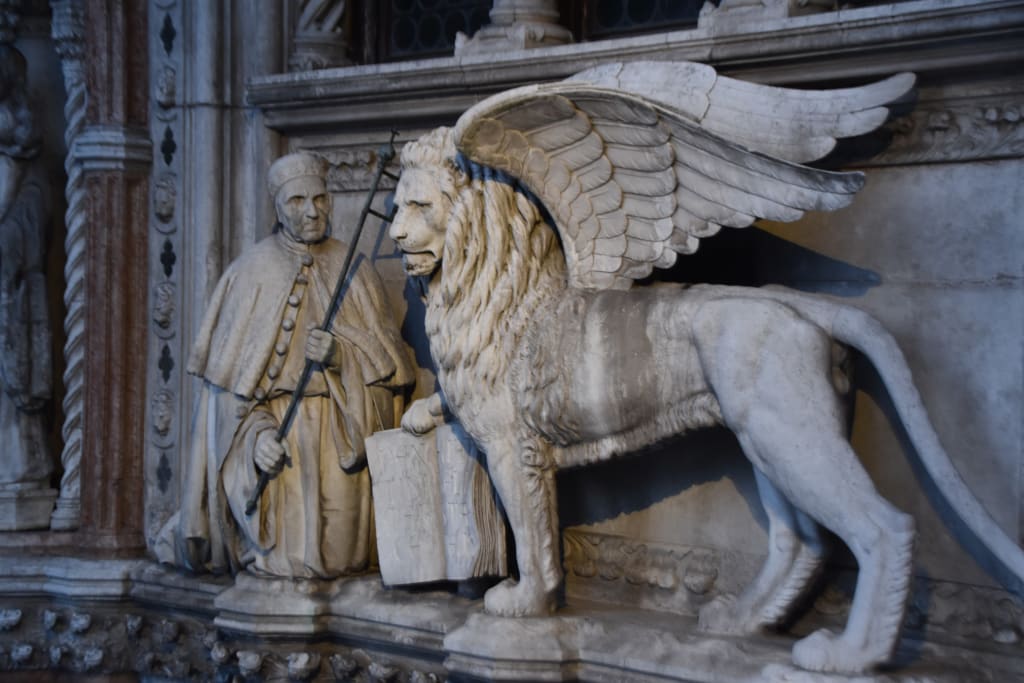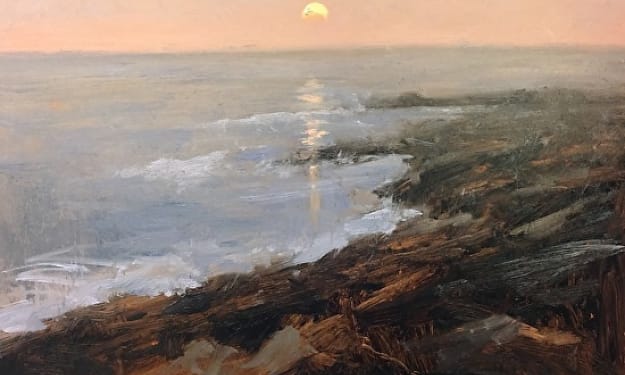Street Shrines
This was not a godless story.

I began in Paris, in a two-star hotel that overlooked a boarded-up boulangerie and where I was awoken at dawn each morning by the shouts of skateboarders in the nearby Place de la République.
There was a youthful rowdiness to the neighbourhood, an ambience only further amplified by the anarchist scrawl on nearly every blank wall: L’amour est mort, one bitter youth had painted along the base of a huge statue, while another graffito quoted the Book of Deuteronomy.
There was a general sense of apocalyptic joy. Yet I found myself disappointed, wishing I had spent more time in delightfully morbid Montmartre. By the end of two weeks, I was ready to leave.
*
My train was direct: from the bustling Parisian metro straight to the ancient and beautiful City of Canals. I slept fitfully in the overnight sleeper car as the train rolled through the Italian countryside, my phone plugged into an outlet on the top bunk, my only companions a pair of chatty French women, their grimy white dog, and a Heather O’Neill novel.
I missed most of the sights in the darkness, but when I abruptly woke late in the morning I ran to the aisle and stood to watch, a teenage American girl beside me. We stood in silent awe, disregarding each other.
We gazed at the summer-green fields, the lemon trees, the flat-roofed houses, the linens drying on the heat in a dozen backyards where a dozen different lives unfolded without my knowledge. Where teenagers smoked their first cigarettes and drank their first beers, and housewives in white cotton dresses laboured in the fields, and farmers wrote poetry at sundown with mangy heelers nipping at their feet.
Eventually the reverie had to come to an end. Trains are liminal spaces like no other, enigmatic and mysterious yet destined to take one to a final place. And we had arrived.
I pulled myself away, began to pack up my things. I placed a straw hat on my head, annoyed at my hair. My once-fresh blonde balayage had been growing steadily brassier and more tangled in the European heat, but such vanities would have to wait until I returned home.
I followed the crowd outside in a haze. My head and body were light with fatigue, but almost immediately upon rejoining reality, I was thrust into a dizzying atmosphere I could not possibly ignore.
I was unprepared for the immediate change in atmosphere. It was by all accounts an afternoon like no other, yet everyone here seemed to be celebrating for no discernable reason. The midday sun scorched the cobblestone sidewalks from the clearest blue sky I had ever seen. The raucous shouts of street vendors cut through the air.
I would have brightened more if not for the ache in my shoulder. I had been carrying my leather overnight bag, along with my one small suitcase, for far too many hours now, and the twinge had turned to a constant tormenting throb in my collarbone.
My pursuit was simple. I needed to reach my hotel. I knew it was directly up the road, past an authentic gelato shop. (That, I told myself, would definitely require my attention later on.) My route could not have been simpler. Nevertheless, I could not reach it without passing through the spirited crowd, seemingly divided about equally between tourists and locals enthusiastically selling their wares.
And so I became a part of the melee, an accidental, anonymous wayward, no longer an observer but an active participant. As I ambled through the crowd, tired and sore, I became aware of an olive-skinned vendor with a greenish glass bottle in his hand. He caught my eye and flashed me a jovial smile.
“Limoncello?” he asked, already pouring a shot.
I had never tasted it before. I had never heard the term. This was my first time in Europe, twenty-seven years old and shamefully oblivious.
There were multiple bottles lined up on a flimsy table outside the shop, each containing a liqueur in a brighter shade of yellow than the next. I ended up trying one from Bergamo, the region that, six months later, would be flooded with coronavirus infections.
The taste was bold and sharp. I raised my eyebrows and nodded approvingly. This was something to remember, I told the street seller, and thanked him sincerely. I would have to return. But first, I had to find my hotel. My upper arms were numb and sore and tingling. The aftertaste of dreams remained in my head, foggy from the train ride.
The only souvenirs I had carried across the border: a bottle of absinthe, a toy carousel for my cousin’s baby, and a gold necklace emblazoned with the symbol of a star.
*
That night I wore a satin slip dress and ate fusilli with cream sauce on a moonlit patio. I had always had an affinity for dining alone, but I couldn’t help but fall into the age-old habit necessitated by my calling as a writer: the role of an acute observer, a shameless people-watcher. Sometimes, I had been told, I stared too long. But in a foreign country, when most everyone would remain a permanent stranger, did it really matter?
As I ate, I overheard the murmurs of a couple seated nearby, speaking in English. Their accent, similar to my own, sparked my intrigue. Quickly I transitioned from outsider to insider, joining their conversation. We were all lightly buzzed from the wine and feeling joyously optimistic, dining beneath foreign stars and drinking Italian vino bianco and, at least on my part, fearing nothing.
I learned that they were in their late fifties, my parents’ age. They were Canadian, like myself, though from the opposite coast. As the waiter circled back to refill our glasses, they told me their own story, one quite typical of British Columbians: they had invested spontaneously in the burgeoning cannabis trade the year previously, when marijuana was legalized, and were now reaping the rewards.
“We’re making a killing.” They grinned in unison, raising a toast. “Hopefully it keeps going well, so we can keep doing this.”
The man gestured around at our surroundings, and his wife laughed.
*
I would encounter several more people from my home country over the next two days: a Vancouver man seated next to me on the water taxi, a group of Torontonian women on a girls’ trip. I wondered at the statistical chances of this, at the possibility there was no such thing as coincidence.
Every day I marvelled at the cleanliness of the city, at the regality of the ancient buildings along the waterways. Months later, in March, dolphins would appear in the canals, their smooth bodies visible beneath the crystalline water. The city would go dark. I could not have known. No one could have known.
*
In the daytime I wandered, seeking sentimental souvenirs I could easily fit into my suitcase. In a crowded shop that seemed to stock only antique clocks, I found an astrological compass. I placed it on the counter with eagerness and the grey-haired owner looked bemused.
“It doesn’t work too well,” he advised me.
I took my chances and paid fifty euros, certain that I had found the most interesting item I could possibly carry back home with me.
Perhaps the shop owner, who had been disgruntled when I had inquired about the shop’s social media presence, had simply been a skeptic. Perhaps, in this culturally Catholic country, he was devout enough to discourage astrological practice and glad to be rid of the cursed object. Perhaps he did not understand what it was supposed to do at all.
Later that night in my hotel room I set it on the desk and allowed the needle to swing, reminded of an artefact from a beloved childhood fantasy novel. I watched it intently, until it eventually settled, undisturbed, upon a familiar axis: the water-bearer, the lion.
In this city where the symbol of Leo stood with majesty and authority on nearly every street corner, the coincidence seemed more like an example of synchronicity that would have roused Jung.
*
There was something else at every street corner, something more subtle yet ultimately more memorable for me. I had always wished to bring home a gold winged lion figurine from Venice—and I did—but it was not the lions that stayed in my dreams and memories the way the street shrines did.
I tended to wander at dusk, when the Venetian streets were quieter, and it was here where I had my first encounter with what would be a series of devotional shrines.
Flowers in full bloom beneath an archaic Marian statue in prayerful repose, an illuminated halo around her veiled head. A framed mosaic with a white painted roof surrounding the image of St. Vincent. A trompe-l'œil crypt. A black gate with a simple white cross: Madonna del alute printed in faded stencil.
None were exactly alike. Aesthetically, and presumably theologically, they appeared to serve different purposes. They called to me, a struggling faithful agnostic, in a way that the suburban megachurch with its neon glow, or even the grit of the southern gothic church on a hill, never had.
I found traces of this history wherever I least expected it. This was all a tremendous curiosity to me: both the overt religiosity of the city and the uniquely timeless quality of the shrines, clumsily stitched together like patchwork. They seemed to have always been there, to have risen like mirages from the fog. Their maintenance seemed as important to the city’s natives as that of the streets and waterways.
This was an old faith, displayed in a city seemingly trapped in time. Venice was its own fairytale, and it was not a godless story.
*
I wondered again about coincidence as I made my exit from the Floating City that day in late August, headed to the train station where I would make the afternoon trip down to Rome. There, I would meet my best friend, flying in from Vienna to meet me in the city we had always sworn to visit together. I had booked an appointment ahead of time to get a tattoo at a local shop, and specifically saved my bottle of absinthe to share.
I had fallen into a microsleep on the water taxi, dehydrated under the late summer sun. I longed for the air-conditioned interior of the station, for the novel I had become engrossed with but hadn’t opened since France. My shoulder was beginning to pain me again, and as I pulled my luggage along the clattering sidewalk, a dark-skinned man, no older than thirty, approached.
“Do you need help?” he inquired in lightly accented yet perfectly fluent English. I appreciated the Italian friendliness, the instant camaraderie one felt around these lively and happy people.
When anyone travels alone, they must learn quickly to trust in the kindness of strangers. I allowed him to guide me the five or six blocks to the train station, listening to him share his plans of attending a doctorate program in Boston the following spring.
As we parted ways, the lingering sense of a potential shared connection remained, something electric. He smiled shyly as he said goodbye, seeming to hesitate on the platform. For a moment I was certain he would request my contact information. It was nervousness, on his part, that seemed to stop him.
For my own part, I think I was simply afraid to break what felt like a uniquely enchanting travel experience that few people are fortunate enough to be granted in the digital age. Further communication, I suspected, might disrupt the spell.
On a superficial level, I wished to speak with him longer, but I wished more for the mystery that came with the unknowing. I had the acute sense that we were ships in the night, momentarily crossing wires. I did not even know his name.
I carried my winged lion and compass home, across multiple time zones, to occupy space on my bedside table.
About the Creator
Carly Bush
I'm a writer with a passion for highly visual and quietly subversive literature. I contribute to Collective World and you can find my short stories and poetry here.
Connect with me on Instagram and TikTok: @carlyaugustabush
Enjoyed the story? Support the Creator.
Subscribe for free to receive all their stories in your feed. You could also pledge your support or give them a one-off tip, letting them know you appreciate their work.








Comments (11)
this was an interesting story. a treatise on the remarkable novelty of travel, tripping from one country or time zone to the next and discovering new worlds. i've lived abroad and you captured the feeling of vacationing in Europe really well! it reads like a travel journal, or a montage of soft, soothing scenes, but with deeper meaning behind it that would require analysis. congrats on the win! i'm impressed with your repertoire of shortlists too. :)
I have travelled a lot, but rarely on my own for more than 24 hours, this makes that feel like quite a different experience.
This is truly wonderful writing and deserving of the win. I'm also Canadian, from the east coast and your story reminded me of a trip many years ago that I took to China. I met many Canadian travelers on that trip but I also met the most important person in my life there, my Chinese wife!
Beautifully written, elegant and whimsical -Super congratulations on your wonderful achievement 🤍🤍🤍
Wonderful and riveting work of art. Congratulations for your well deserved win. Your writing is simply beautiful—thoughtful, sensitive, and engaging. Well done 😍
Italy has long been on my bucket list of places I truly wish to visit. The sheer history and mythological lustre enchants my imagination. I truly enjoyed this memoir of your trip. Very well done. Congratulations on winning the challenge.
You brought so many memories flooding throughout me, as I had a similar tr. and my own story of Limoncello. Congratulations
Nice light travel story, congrats on winning. Refreshing to read a happy memoir chapter! I travelled to Italy for the first time last summer and had also travelled by train and bus from paris so this felt so familiar! I stayed for two weeks in Turin ,lots of history, few tourists, and good value on airbnbs in that city. I def agree on "the instant camaraderie one felt around these lively and happy people." I was so often greeted in cafes and restaurants as if I was a long lost relative and sometimes given free extras. Glad to hear you had a fun trip too.
This is such a fantastic read. Immersive, philosophical, magical. I am completely in love with your travels, as you've presented here. Themes of religion, synchronicity, and symbolism all run through this piece, and I sense would run through your entire memoir as well. What a perfect entry in the challenge, and also, a well-deserved win. Congratulations, Carly! I was SO excited when I saw your name! This has been a long time coming. :D
Awesome ✨ and Congratulations on your Win 🏆 💸🏅🎉🌟📝♥️👍😉
This was beautifully written, I really enjoyed it! I can read a million travel stories, but each one is special in its own way. Travel is as much about people as it is about place. Loved it!